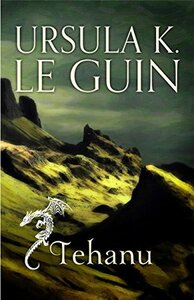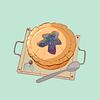Take a photo of a barcode or cover
Ged has returned to Gont in order to recover and come to terms with the loss of his powers. Ogion, his mentor, died only a few days before. But waiting for him is Tenar, formerly the priestess of the Tombs of Atuan. She has adopted Therru, and abused and tortured little girl. Together they heal--and also have to fight evil men and evil magic. Since he's no longer a mage, Ged and Tenar are able to have a relationship. Turns out Therru is Tehanu--a child of the dragon Kalessin, a possibly a future archmage. She chooses to remain with Tenar and Ged, who take over Ogion's farm.
I liked this book well enough when I read it shortly after publication, as a young woman. Reading it now, 30 years later, was a revelation. Now, it speaks to me personally, to my thoughts on women and the choices we make in life, to women and our role in society.
Beautiful and thought provoking.
Beautiful and thought provoking.
I don't know why it's taken me so many years to finally try this book; I've loved the original Earthsea trilogy since I was a child. Maybe I was scared I wouldn't like this one? And maybe if I'd read it when it first came out, I wouldn't have liked it so much...?
Well, now I have finally read it, and I like it more than I can say. Beautiful, quiet, tender, harrowing. The Tombs of Atuan has long been my favourite Earthsea book, but Tehanu, I think, has matched it. This book feels like it's been burned onto the paper with an intensity rarely seen in fantasy writing. It's heartfelt, angry, painful and ferociously, delicately human.
Well, now I have finally read it, and I like it more than I can say. Beautiful, quiet, tender, harrowing. The Tombs of Atuan has long been my favourite Earthsea book, but Tehanu, I think, has matched it. This book feels like it's been burned onto the paper with an intensity rarely seen in fantasy writing. It's heartfelt, angry, painful and ferociously, delicately human.
The pacing falls apart in the third act, and I'm suddenly questioning my decision to gift the full Earthsea cycle to my young nephew because dang does it veer sharply more adult in tone and theme.
Still, it was great to follow up with Tenar and further explore the nature of power and gender and societal expectations in a brilliant fantasy world. She remains an excellent character, all the more excellent for her contrast against the many men constraining and defining her over the course of her life.
Still, it was great to follow up with Tenar and further explore the nature of power and gender and societal expectations in a brilliant fantasy world. She remains an excellent character, all the more excellent for her contrast against the many men constraining and defining her over the course of her life.
Surprisingly intriguing considering I don't particularly care about Ged/Tenar as a relationship, but I hope they find peace
medium-paced
challenging
emotional
hopeful
reflective
slow-paced
Plot or Character Driven:
Character
Strong character development:
Yes
Loveable characters:
Yes
Diverse cast of characters:
Complicated
Flaws of characters a main focus:
Yes
The fourth book of the Earthsea Cycle is absolutely my favourite one of the lot. A slower paced, character driven reflection piece here replaces the previous tales of adventure and quest, and while this could feel jarring Le Guin makes the most of this genre shift.
Returning favourite Tenar takes centre stage, and like Tombs of Atuan this book draws a lot on Maureen Murdock's work in setting out the direction for her character after escaping the cult who raised her. The book really takes big advantage of where she finds herself, with Ged outright being disappointed in her for her choice of an unambitious life as a bride to a farmer. These ideas of power (as understood in masculine frameworks, and the weaknesses therewithin) are something this book is very concerned with exploring, and several characters ofter interesting insights.
Ged himself takes something of a back seat, with this story featuring him more as a legacy character who prompts the development of the main characters. We see him in a very emotionally vulnerable place, and he and Tenar are now in a position where they are truly equal. It leads to some interesting dynamics that fit Le Guin's love of little things.
I feel like the quality of an Earthsea book is inversely proportional to its stakes. The attention the author pays in the mundane moments to how even the most innocuous things can point to universal truths, and how even those without what might be, in a masculine framework, power, are in fact the greatest and most powerful. Here, with the attention focusing on Tenar's personal difficulties in life as she raises the mysterious Therru, this setting is able to fully take advantage of its potential to specifically draw attention away from the classical grand world saving adventures and towards this story of an old woman trying to keep her adopted daughter safe while different men around her, all of whom are on their own grand adventures of different kinds, form obstacles as much out of their understanding of the world as their intentions.
This book never left me with the sort of "holy shit, I have been left stunned with a passage or a twist that is unlike anything I've ever read and changes how I engage with literature" which I feel a 1o requires. It did, however, present a fantastic, compelling, and invigorating anti-adventure, wherein there was peril and there was a treacherous journey, but the objective was internal.
As these characters get old, they must, as the book impresses, move into the greatest maturity which is becoming a person who is of being rather than doing. Ged's adventures are over, his powers are spent, but he still has value, even if not through the framework of action. He is a person who lives and deserves that, just like Tenar, and just like Therru. The characters who suffer, on the contrast, are characters who do not appreciate this.
I do love this book. It's the best of the four, but you do need to read all four for this to hit as hard as it does.
Returning favourite Tenar takes centre stage, and like Tombs of Atuan this book draws a lot on Maureen Murdock's work in setting out the direction for her character after escaping the cult who raised her. The book really takes big advantage of where she finds herself, with Ged outright being disappointed in her for her choice of an unambitious life as a bride to a farmer. These ideas of power (as understood in masculine frameworks, and the weaknesses therewithin) are something this book is very concerned with exploring, and several characters ofter interesting insights.
Ged himself takes something of a back seat, with this story featuring him more as a legacy character who prompts the development of the main characters. We see him in a very emotionally vulnerable place, and he and Tenar are now in a position where they are truly equal. It leads to some interesting dynamics that fit Le Guin's love of little things.
I feel like the quality of an Earthsea book is inversely proportional to its stakes. The attention the author pays in the mundane moments to how even the most innocuous things can point to universal truths, and how even those without what might be, in a masculine framework, power, are in fact the greatest and most powerful. Here, with the attention focusing on Tenar's personal difficulties in life as she raises the mysterious Therru, this setting is able to fully take advantage of its potential to specifically draw attention away from the classical grand world saving adventures and towards this story of an old woman trying to keep her adopted daughter safe while different men around her, all of whom are on their own grand adventures of different kinds, form obstacles as much out of their understanding of the world as their intentions.
This book never left me with the sort of "holy shit, I have been left stunned with a passage or a twist that is unlike anything I've ever read and changes how I engage with literature" which I feel a 1o requires. It did, however, present a fantastic, compelling, and invigorating anti-adventure, wherein there was peril and there was a treacherous journey, but the objective was internal.
As these characters get old, they must, as the book impresses, move into the greatest maturity which is becoming a person who is of being rather than doing. Ged's adventures are over, his powers are spent, but he still has value, even if not through the framework of action. He is a person who lives and deserves that, just like Tenar, and just like Therru. The characters who suffer, on the contrast, are characters who do not appreciate this.
I do love this book. It's the best of the four, but you do need to read all four for this to hit as hard as it does.
It is extremely important to read the Earthsea series in order.
I said the previous book goes hard, and it does, but I’d argue this book goes harder. It’s raw and angry and confused and easily the best book in the series. There aren’t any insane dragons or magical maladies, just people dealing with hate and change. Brilliant.
My Earthsea Reviews:
A Wizard of Earthsea 4 Stars
The Tombs of Atuan 4 Stars
The Farthest Shore 4 Stars
Tehanu 5 Stars
Tales from Earthsea 4 Stars
The Other Wind 4 Stars
I said the previous book goes hard, and it does, but I’d argue this book goes harder. It’s raw and angry and confused and easily the best book in the series. There aren’t any insane dragons or magical maladies, just people dealing with hate and change. Brilliant.
My Earthsea Reviews:
A Wizard of Earthsea 4 Stars
The Tombs of Atuan 4 Stars
The Farthest Shore 4 Stars
Tehanu 5 Stars
Tales from Earthsea 4 Stars
The Other Wind 4 Stars
This is a return to the character driven story of Tombs of Atuan, which I much prefer to the grand mythological and didactic prose of Wizard and Farthest Shore. Le Guin is at her strongest here with an excellent sense of interiority, complete with intrusive thoughts, anger and empathy. Sometimes the real threat isn't the existential threat of the undead sorcerer but the terror in the small grievances of small men and their greed.






